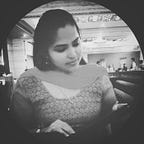Menstruation and Women Empowerment
Menstruation is not merely what society thinks of it to be. It is unfortunate that the narratives built around menstruation only focus on hygiene and eco-friendly pads - that needs to change!
I was in 8th standard when I got my periods at the age of 13. I was made aware of periods in my sixth standard itself by my school science teachers.
I was not afraid when I realised I got my first periods. I even today remember that it was Sunday and I was preparing for my 'English Unit Test' that day. The biggest fear that haunted me was of the pain which accompanied with the periods on the first two days. Heavy blood flow meant changing and using washroom at frequent intervals to maintain menstrual hygiene. I think I was naive because I had to experience much more than what I feared.
Pain varies from severe to mild and it is usually natural. I remember once in high school I experienced terrible pain. I thought I would die and my teacher said, "If you cannot bear this then how will you give birth to a child?" Well, that was the moment when I learnt how socially stigmatic it is to accept our pain. My school teacher didn’t realise that if my pain would have been a normal pain, something which I always experienced then I would not have cried on the second day of my periods. Fortunately, a friend rushed me to the school’s medical room and offered me some warm cardamom milk. Though, my school principal was very empathetic and sensing the severity of the problem, she sent me to home and sanctioned my leaves for first two days of every month whenever I had periods.
I have personally engaged in discussions with many girls and no one talks about normalising the pain which they experience. Irrespective, of their weight or shape, globally many girls and women experience painful periods for first or first two days of their periods. Again, that’s completely normal but it could be a symptom of PCOS and PCOD. Thanks to our myths, our daughters need more menstrual awareness than before.
- While pain is natural, excessive pain requires medication. A visit to doctor in extreme case of pain is a must.
- PCOS or PCOD can happen to both unmarried and married girls. It is a myth that it does not happen to unmarried girls.
- Adolescent girls are at risk as much as adult women. It’s a myth that PCOS does not happen to adolescent girls.
- Intermittent fasting can help in maintaining weight in PCOS. However, intermittent fasting can only be practiced in those cases where women or young girls are not diabetic.
In the year 2021-2022, I got an opportunity to discuss menstruation and menstrual hygiene with almost 150 girls and women. Everyone said how difficult it was for them to travel alone during menstruation. Some said that their schools and workplaces did not have clean washrooms, due to which they were forced to take a leave. None of these women were happy about taking leaves in their periods. They took a leave because they were not comfortable with the state of washrooms at their workplace and schools.
I see that even men discuss washrooms these days and emphasize on the importance of menstrual hygiene.
According to the report, Dignity for Her, “Girls tend to miss school six days a month on an average due to the inability to manage their periods at school. This eventually contributes to almost 23 per cent girls dropping out of school on reaching puberty, which critically undermines their potential as individuals and future workers.”
We are living in an era where we just cannot afford our girls and women to sit back at homes because of menstrual problems. Manish Kelshikar, founder of Woloo App promises to resolve this social problem that has for long been obstructing the safe mobility of women during their periods. Woloo application helps women locate their nearest, clean, safe, and hygienic washrooms. However, we all know that the problem is not just about clean washrooms but also the awareness that women/girls lack about their bodies. For that we need to promote more open forums, where intellectuals, educators and innovators with relevant experience share their insights and solutions.
To ensure that our women are truly empowered, we need to focus on their overall well-being. So, next time a school going girl or an office going woman share their menstrual problems with you then do not laugh at them. Offer a concrete solution or wise advice to them and make them feel comfortable by persuading them to see a doctor if required. Our girls are our future and our women form a significant percentage of our workforce. So, why do we hesitate discussing menstruation? Let us keep it simple but let us not shy away from raising collective awareness on menstrual hygiene and menstrual health.
